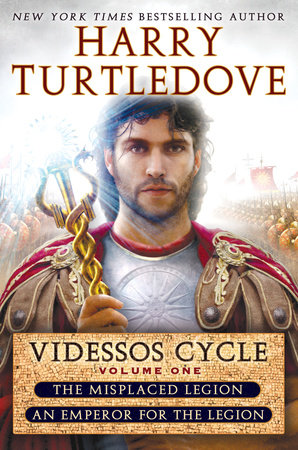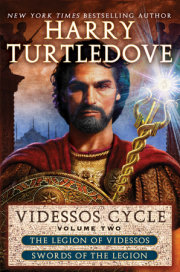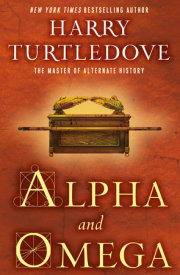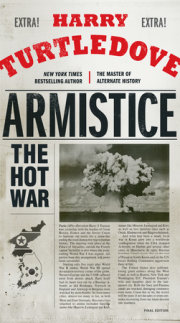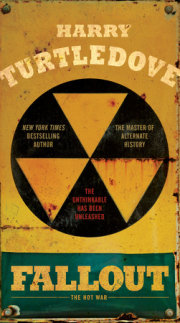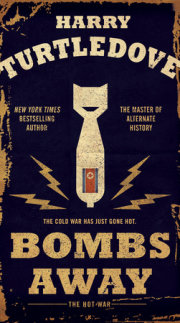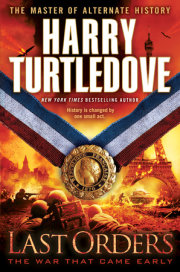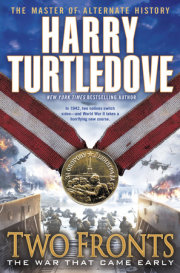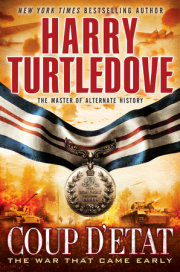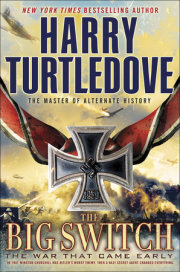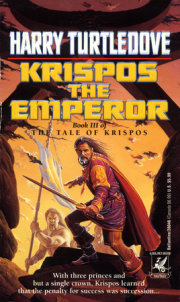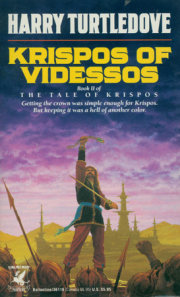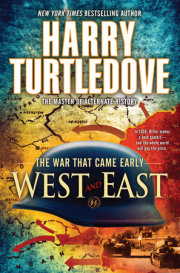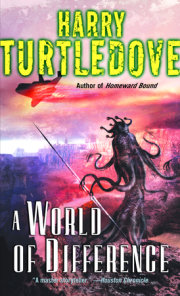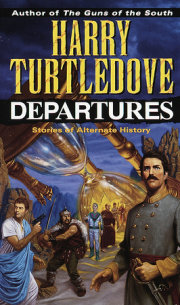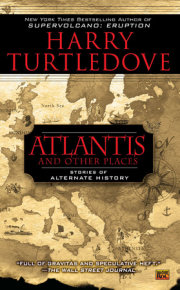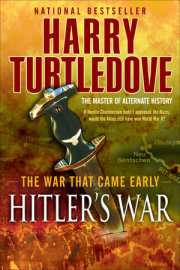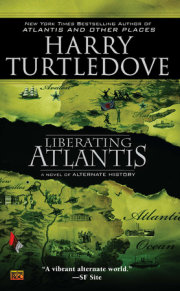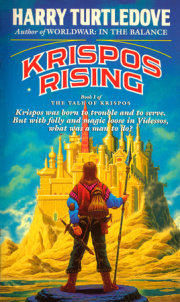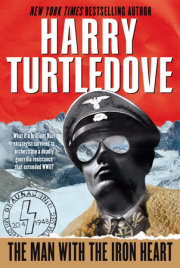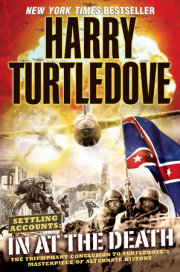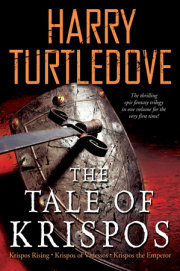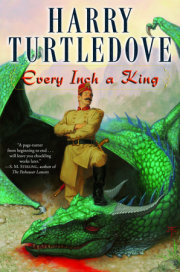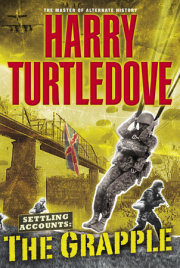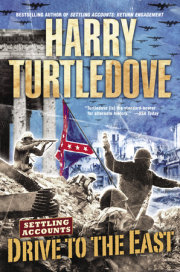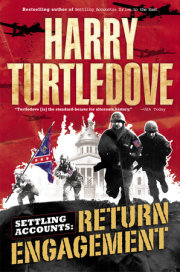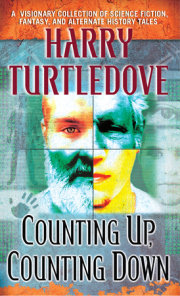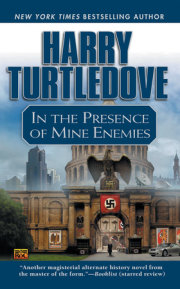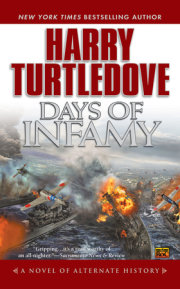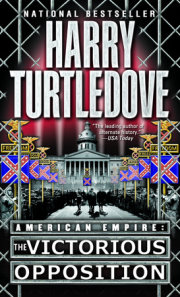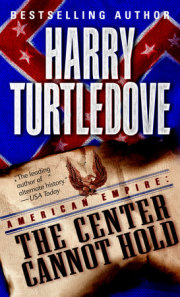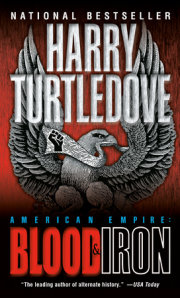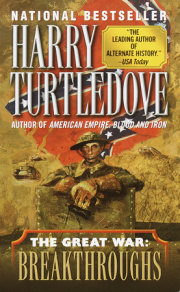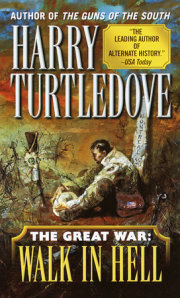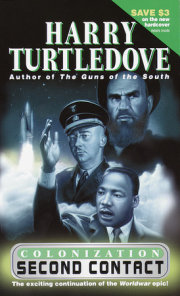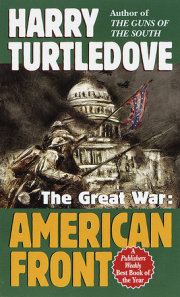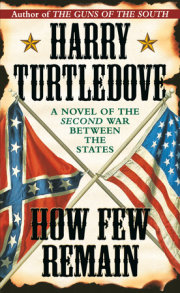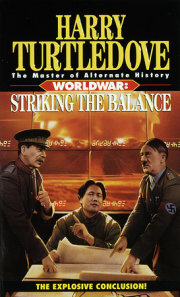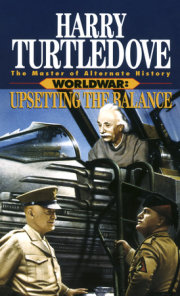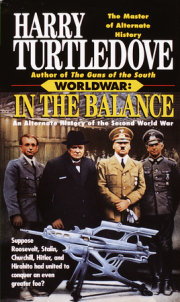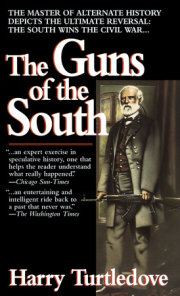I
The sun of northern Gaul was pale, nothing like the hot, lusty torch that flamed over Italy. In the dim stillness beneath the trees, its light came wan, green, and shifting, almost as if undersea. The Romans pushing their way down the narrow forest track took their mood from their surroundings. They moved quietly; no trumpets or bawdy marching songs announced their coming. The daunting woods ignored them.
Peering into the forest, Marcus Aemilius Scaurus wished he had more men. Caesar and the main Roman army were a hundred miles to the southwest, moving against the Veneti on the Atlantic coast. Scaurus’ three cohorts—“a reconaissance in force,” his superior had called them—were more than enough to attract the attention of the Gauls, but might be unable to deal with it, once attracted.
“Only too right,” Gaius Philippus answered when the tribune said that aloud. The senior centurion, hair going gray and face tanned and lined by a lifetime on campaign, had long ago lost optimism with the other illusions of his youth. Though Scaurus’ birth gave him higher rank, he had the sense to rely on his vastly experienced aide.
Gaius Philippus cast a critical eye on the Roman column. “Close it up, there!” he rasped, startlingly loud in the quiet. His gnarled vine-staff badge of office thwacked against his greave to punctuate the order. He quirked an eyebrow at Scaurus. “You’ve nothing to worry about anyway, sir. One look and the Gauls will think you’re one of theirs on a masquerade.”
The military tribune gave a wry nod. His family sprang from Mediolanum in northern Italy. He was tall and blond as any Celt and used to the twitting his countrymen dished out. Seeing he’d failed to hit a nerve, Gaius Philippus took another tack. “It’s not just your looks, you know—that damned sword gives you away, too.”
That hit home. Marcus was proud of his blade, a three-foot Gallic longsword he had taken from a slain Druid a year ago. It was fine steel and better suited to his height and reach than the stubby Roman gladii. “You know full well I had an armorer give it a decent point,” he said. “When I use a sword, I’m not such a fool as to slash with it.”
“A good thing, too. It’s the point, not the edge, that brings a man down. Hello, what’s this about?” Gaius Philippus added as four of the small army’s scouts dashed into the woods, weapons in hand. They came out a few moments later, three of them forcibly escorting a short, scrawny Gaul while the fourth carried the spear he had borne.
As they dragged their captive up to Scaurus, their leader, an underofficer named Junius Blaesus, said, “I’d thought someone was keeping an eye on us this past half hour and more, sir. This fellow finally showed himself.”
Scaurus looked the Celt over. Apart from the bloody nose and puffed eye the Romans had given him, he could have been any of a thousand Gallic farmers: baggy woolen trousers, checked tunic—torn now—long, fair hair, indifferently shaven face. “Do you speak Latin?” the military tribune asked him.
The only answer he got was a one-eyed glare and a head-shake. He shrugged. “Liscus!” he called, and the unit’s interpreter trotted up. He was from the Aedui, a clan of south central Gaul long friendly to Rome, and wore a legionary’s crested helm over bright curls cut short in the Roman fashion. The prisoner gave him an even blacker stare than the one he had bestowed on Scaurus. “Ask him what he was doing shadowing us.”
“I will that, sir,” Liscus said, and put the question into the musical Celtic speech. The captive hesitated, then answered in single short sentence. “Hunting boar, he says he was,” Liscus reported.
“By himself? No one would be such a fool,” Marcus said.
“And this is no boarspear, either,” Gaius Philippus said, grabbing it from a scout. “Where’s the crosspiece below the head? Without one, a boar will run right up your shaft and rip your guts out.”
Marcus turned to Liscus. “The truth this time, tell him. We’ll have it from him, one way or another. The choice is his: he can give it or we can wring it from him.” Marcus doubted he could torture a man in cold blood, but there was no reason to let the Celt know that.
But Liscus was only starting to speak when the prisoner, with a lithe twist and a kick, jerked free of the men holding him. His hand flashed to a leaf-shaped dagger cunningly slung below his left shoulder. Before the startled Romans could stop him, he thrust the point between his ribs and into his heart. As he toppled, he said, “To the crows with you,” in perfect Latin.
Knowing it would do no good, Scaurus shouted for a physician; the Celt was dead before the man arrived. The doctor, a sharp-tongued Greek named Gorgidas, glanced at the protruding knife hilt and snapped, “You ask too much of me, you know. I’ll close his eyes for him if you like.”
“Never mind. Even while I called, I knew there was nothing you could do.” The tribune turned to Junius Blaesus. “You and your men did well to find the spy and bring him in—not so well in not searching him carefully and keeping a lax hold on him. The Gauls must have something in the wind, though we’ve lost the chance to find out what. Double your patrols and keep them well out in front—the more warning of trouble we have, the better.” Blaesus saluted and hurried off, thankful to get away with no harsher reprimand.
“Full battle readiness, sir?” Gaius Philippus asked.
“Yes.” Marcus cocked an eye at the westering sun. “I hope we can find a clearing before dusk for an encampment. I’d feel safer behind earthworks.”
“And I. I’d feel safer still with a couple of legions at my back.” The centurion went off to make the needful changes in the Romans’ marching order, bringing his spear-throwers forward and tightening up the distance between each maniple and its neighbor. An excited hum ran through the ranks. Here a man hastily sharpened his sword, there another cut short a leather sandal strap that might trip him in action, still another took a last swig of sour wine.
Shouts came from up ahead, out of sight beyond a bend in the path. A minute or so later a scout jogged back to the main body of troops. “We spied another skulker in the bushes, sir. I’m afraid this one got away.”
Marcus whistled tunelessly between his teeth. He dismissed the scout with a word of thanks, then looked to Gaius Philippus, sure the centurion felt the same certainty of trouble he did himself. Gaius Philippus nodded at his unspoken thought. “Aye, we’re for it, right enough.”
But when another of the advance guards came back to report the path opening out into a sizable clearing, the military tribune began to breathe more easily. Even the small force he led—not quite a third of a legion—could quickly build field fortifications strong enough to hold off many times its number of barbarians.
The clearing was large, several hundred yards of meadow set in the midst of the deep wood. The evening mist was already beginning to gather above the grass. A stream trickled through the center of the clearing; half a dozen startled teal leaped into the air as the Romans began emerging. “Very good indeed,” Scaurus said. “Perfect, in fact.”
“Not quite, I’m afraid,” Gaius Philippus said. He pointed to the far edge of the clearing, where the Celtic army was coming out.
Marcus wasted a moment cursing; another hour and his men would have been safe. No help for it now. “Trumpets and cornets together!” he ordered the buccinators.
As the call to action rang out, Gaius Philippus’ voice rang with it. The senior centurion was in his element, readying his troops. “Deploy as you debouch!” he shouted. “Three lines—you know the drill! Skirmishers up ahead, then you front-rankers with your pila, then the heavy infantry, then reserves! Come on, move—yes, you there, you worthless whoreson!” His vine-stave thudded down on the slow legionary’s corseleted back. Junior centurions and underofficers echoed and amplified his commands, yelling and prodding their men into place.
The deployment took only minutes. Beyond posting an extra squad of slingers and some protecting spearmen on the slightly higher ground to his right, Scaurus kept a symmetrical front as he waited to see how many enemies he faced.
“Is there no end to them?” Gaius Philippus muttered by his side. File after file of Gauls moved into the clearing, slowly going into line of battle. Well-armored and powerfully armed nobles shouted and waved as they tried to position their bands of retainers but, as always among the Celts, discipline was tenuous. Most of the men the nobles led had gear far poorer than theirs: a spear or slashing sword, perhaps a large oblong shield of wood painted in bright spirals. Except for the nobles, few wore more armor than a leather jerkin, or at most a helmet. Of the cuirasses to be seen, most were Roman work, the spoil of earlier battles.
“What do you make of them? About three thousand?” Marcus asked when the Celtic flood at last stopped flowing.
“Aye, about two for our one. It could be worse. Of course,” Gaius Philippus went on, “it could be a damned sight better, too.”
On the far side of the clearing the Gauls’ commander, splendid in armor of black and gold and a cape of crimson-dyed skins, harangued his men, whipping them up into a fighting frenzy. He was too far away for the Romans to make out his words, but the fierce yells of his listeners and the deep thudding of spearshafts on shields told of the fury he was rousing.
Heads turned Scaurus’ way as he strode out in front of his own troops. He paused for a moment, gathering his thoughts and waiting for the full attention of his men. Though he had never given a pre-combat oration, he was used to public speaking, having twice run for a magistracy in his home town—the second time successfully. The technique, if not the occasion, seemed similar.
“We’ve all of us heard Caesar,” he began, and at the mention of their beloved marshal of legionaries they shouted approval as he had hoped. He went on, “We all know I can’t talk that well, and I don’t intend to try.” He quieted the small laugh from the men with an upraised hand. “No need, anyhow—things are very simple. Caesar is five days’ march from here at most. We’ve beaten the Gauls time and again. One more win here, now, and there’s not the chance of a frog at a snake symposium that they’ll be able to put anything in our way before we can link up with him again.”
The Romans cheered. The Gauls shouted back, shaking their fists, waving their spears, and yelling bloodthirsty threats in their own language.
“I’ve heard worse,” Gaius Philippus said of the speech. From him it was high praise, but Scaurus only half heard him. Most of his attention was on the Celts, who, behind their tall leader, were trotting at the Romans. He would have liked to meet them at the streamlet in mid-clearing, but to do so he would have had to pull his line away from the woods which anchored its flanks.
Only skirmishers contested the crossing. Slingers sent leaden bullets whizzing into the ranks of the Gauls, to bang off shields or slap into flesh. Archers added their fire, drawing back to the breast and emptying quivers as fast as they could. Here and there along the barbarians’ line a man stumbled and fell, but the damage was only a pinprick to the onrushing mass.
The Celts raised a cheer as one of their archers transfixed a Roman slinger as he was letting fly. The bullet he had been about to loose flew harmlessly into the air.
The Celts drew nearer, splashing through the ankle-deep water of the rivulet. The Roman skirmishers fired a last few shots, then scampered for the protection of their line.
The long Gallic sword felt feather light in Marcus’ hands. The druids’ marks stamped down the length of the blade seemed to glow with a life of their own in the red sunlight of late afternoon. An arrow buried itself in the ground beside the tribune’s feet. Almost without thinking, he shuffled a couple of steps to one side.
The barbarians were so near he could see the scowls darkening their mustachioed faces, could tell their leader bore a sword twin to his own, could all but count the spokes of the bronze wheel cresting that leader’s high-crowned helm. The beat of the Gauls’ feet against the grass was a growing thunder.
“At my command!” Marcus shouted to his first line, raising his blade high over his head. They hefted their pila and waited, quiet and grimly capable. Already, with wild whoops, the Celts were starting to fling their spears, most falling short of the Roman line.
The tribune studied the oncoming mass. A moment more . . . “Loose!” he cried, sword-arm flailing down. Half a thousand arms flung their deadly burdens against the Gauls as one.
The enemy line staggered. Men screamed as they were pierced. Others, luckier, blocked the Romans’ casts with their shields. Yet their luck was mixed, for the soft iron shanks of the pila bent as their points bit, making the weapons useless for a return throw and fouling the shields so they, too, had to be discarded.
“Loose!” Scaurus shouted again. Another volley leaped forth. But the Gauls, brave as they were unruly, kept coming. Their spears were flying too, many of them, even if not in tight volleys. Next to Marcus a man pitched backwards, his throat spurting blood around the javelin that had found its way over his shield. The legionaries pulled stabbing-swords from their scabbards and surged forward as the fighting turned hand-to-hand.
A cry of triumph rose from the Gauls as, spearheaded by two huge blond-maned warriors, they hewed their way through the first Roman rank. Even as the buccinators’ horns trumpeted a warning, a maniple of the second line was moving into the gap. Their short swords flickered now forward, now back, fast and sure as striking snakes; their tall, semicylindrical scuta turned the strokes of the foe. The Celtic champions died in moments, each beset by half a dozen men. Surrounded on three sides, most of their followers fell with them. The Romans, in their turn, raised the victory shout.
Marcus sent another maniple to the left flank to deal with a breakthrough. They contained it, but that part of the line still sagged. The Celtic chieftain was there, fighting like a demon. Red light flashed from his sword as he lopped off a legionary’s hand, then killed the man as he stood stupidly staring at the spouting stump.
A Gaul charged Scaurus, swinging his sword over his head in great circles as if it were a sling. As the tribune ducked under his wild slash, he caught the reek of ale from the man. He whirled for an answering blow, only to see Gaius Philippus tugging his blade from the Gaul’s body.
The centurion spat contemptuously. “They’re fools. Fighting is far too serious a business to take on drunk.” He looked about. “But there’s so damned many of them.”
Scaurus could only nod. The Roman center was holding, but both flanks bent now. In close fighting the slingers on the right were more liability than asset, for their covering spearmen had to do double duty to keep the Celts off them. Worse yet, bands of Celts were slipping into the woods. Marcus did not think they were running. He was afraid they were working their way round to attack the Roman rear.
Gorgidas the doctor slipped by him to drag a wounded legionary from the line and bandage his gashed thigh. Catching the tribune’s eye, he said, “I’d have been as happy without this chance to ply my trade, you know.” In the heat of the moment he spoke his native Greek.
“I know,” Marcus answered in the same tongue. Then another Celt was on him—a noble, by his bronze breastplate. He feinted low with his spear, thrust high. Scaurus turned the stab with his shield. The spearpoint slid past him off the scutum’s rounded surface; he stepped in close. The Gaul backpedaled for his life, eyes wide and fearfully intent on the motion of the tribune’s sword.
Marcus lunged at the opening under the arm of his corselet. His aim was not quite true, but the thrust punched through his foe’s armor and into his vitals. The barbarian swayed. Bright blood frothed from his nose and mouth as he fell.
“Well struck!” Gaius Philippus shouted.
His sword-arm was red almost to the elbow. Marcus shrugged, not thinking his blow had carried that much force. More likely some smith had jobbed the Gaul, though most Celtic metalworkers took pride in their products.
It was growing dark fast now. Marcus set some men not yet fighting to make torches and pass them forward. His soldiers used them for more than light—a Celt fled shrieking, his long, greasy locks ablaze.
Liscus went down, fighting against the countrymen he had abandoned for Rome. Scaurus felt a stab of remorse. The interpreter had been bright, jolly, and recklessly brave—but then, of how many on both sides might that have been said? Now he was merely dead.
The Gauls pushed forward on either wing, slashing, stabbing, and chopping. Outnumbered, the Romans had to give ground, their line bending away from the covering forest. As he watched them driven back upon themselves, the growing knowledge of defeat pressed its icy weight on Scaurus’ shoulders. He fought on, rushing now here, now there, wherever the fighting was fiercest, shouting orders and encouragement to his men all the while.
In his learning days he had studied under scholars of the Stoic school. Their teachings served him well now. He did not give way to fright or despair, but kept on doing his best, though he knew it might not be enough. Failure, in itself, was not blameworthy. Lack of effort surely was.
Gaius Philippus, who had seen more bumbling young officers than he could remember, watched this one with growing admiration. The fight was not going well, but with numbers so badly against the Romans it was hard to see how it could have gone much better.
The buccinators’ horns blew in high alarm. The woods were screen no more; leaping, yelling Celts burst forward, storming at the Roman rear. Tasting the cup of doom in earnest, Marcus wheeled his last reserves to face them, shouting, “Form circle! Form circle!”
His makeshift rear defense held somehow, beating back the ragged Celtic charge until the Roman circle could take shape. But the trap was sprung. Surrounded deep within the land of their foes, the legionaries could expect but one fate. The night was alive with the Celts’ exultant cries as they flowed round the Roman ring like the sea round a pillar of hard black stone it would soon engulf.
Druids’ marks on his blade flashing in the torchlight, the Gallic chieftain leaped like a wolf against the Roman line. He hewed his way through three ranks of men, then spun and fought his way back to his own men and safety.
“There’s a warrior I’d sooner not come against,” Gaius Philippus said, somberly eyeing the twisted bodies and shattered weapons the Gaul had left behind him.
Marcus gave tribute where it was due. “He is a mighty one.”
The battle slowed, men from both sides leaning on spear or shield as they tried to catch their breath. The moans of the wounded floated up into the night. Somewhere close by, a cricket chirped.
Marcus realized how exhausted he was. His breath came in panting sobs, his legs were leaden, and his cuirass a burden heavier than Atlas had borne. He itched everywhere; dried, crusted sweat cracked whenever he moved. He had long since stopped noticing its salt taste in his mouth or its sting in his eyes.
His hand had been clenched round his sword hilt for so long he had to will it open to reach for the canteen at his side. The warm, sour wine stung his throat as he swallowed.
The moon rose, a couple of days past full and red as if reflecting the light of this grim field.
As if that had been a signal, the Celtic chieftain came up once more. The Romans tensed to receive his onslaught, but he stopped out of weapon range. He put down his sword, raised his bare right hand above his head. “It’s well you’ve fought,” he called to the Romans in fair Latin. “Will you not yield yourselves to me now and ha’ done with this foolish slaughter? Your lives you’ll save, you know.”
The military tribune gave surrender a few seconds’ honest thought. For some reason he was inclined to trust the Gaul’s good intentions, but doubted the barbarian would be able to control his followers after they had the Romans in their power. He remembered all too well the Gallic custom of burning thieves and robbers alive in wickerwork images and knew it would be easy for the Romans, once captive, to be judged such.
One legionary’s comment to his linemate rang loud in the silence: “Bugger the bastard! If he wants us, let him come winkle us out and pay the bill for it!”
After that, Marcus did not feel the need for any direct reply. The Celt understood. “On your heads it will be, then,” he warned.
He turned to his own troops, shouting orders. Men who had chosen to sit for a moment heaved themselves up off their haunches, tightened their grips on spears, swords, clubs. They tramped forward, and the insane smithy’s din of combat began again.
The Roman ring shrank, but would not break. The still bodies of the slain and thrashing forms of the wounded impeded the Gauls’ advance; more than one stumbled to his death trying to climb over them. They came on.
“Give yourselves up, fools, while there’s the most of you alive!” their chieftain yelled to his foes.
“When we said ‘no’ the first time, did you not believe us?” Marcus shouted back.
The Gaul swung up his sword in challenge. “Maybe after the killing of you, the Roman next in line to your honor will have more sense!”
“Not bloody likely!” Gaius Philippus snarled, but the big Celt was already moving. He cut down one Roman and kicked two more aside. He ducked under a broken spear swung club-fashion, lashing out with his blade to hamstring the swinger. Then he was inside the Roman line and loping at Marcus, longsword at the ready.
Copyright © 2013 by Harry Turtledove. All rights reserved. No part of this excerpt may be reproduced or reprinted without permission in writing from the publisher.

